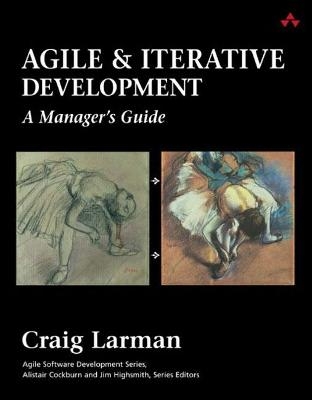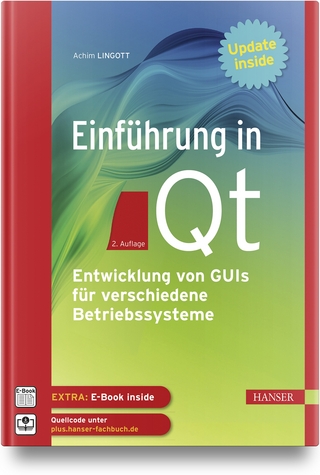
Agile and Iterative Development
Addison Wesley (Verlag)
978-0-13-111155-4 (ISBN)
- Keine Verlagsinformationen verfügbar
- Artikel merken
Agile and iterative methods have emerged as the most popular approaches to software development, and with good reason. Research (examined and cited in detail within this book) shows that iterative methods reduce the risk of failure, compared to traditional models of development. This book is an efficient introduction for both managers and practitioners that need a distilled and carefully organized learning aid for the hands-on practices from planning to requirements to testing and the values that define these methods. The author also provides evidence of the value of switching to agile and iterative methods. By studying this book, the reader will learn to apply the key ideas in agile and iterative development, the details and comparison of four influential iterative methods (Scrum, Extreme Programming, Evo, and the Unified Process), answers to frequently asked questions, and important related management skills. The book's goal is quality information that can be quickly understood and applied.
CRAIG LARMAN is known throughout the international software community as an expert and passionate advocate for object-oriented technologies and development, and iterative and agile development methods. He serves as Chief Scientist at Valtech, a global consulting and skills transfer company, where he has led the adoption of iterative and agile methods. Larman also authored Applying UML and Patterns, the world's best-selling text on object-oriented analysis and design, and iterative development.
1. Introduction.
Software Is New Product Development. What's Next? Web Resources.
2. Iterative <38> Evolutionary.
Iterative Development. Risk-Driven and Client-Driven Iterative Planning. Timeboxed Iterative Development. During the Iteration, No Changes from External Stakeholders. Evolutionary and Adaptive Development. Evolutionary Requirements Analysis. Early “Top Ten” High-Level Requirements and Skillful Analysis. Evolutionary and Adaptive Planning. Incremental Delivery. Evolutionary Delivery. The Most Common Mistake? Specific Iterative <38> Evolutionary Methods. What's Next? Recommended Readings.
3. Agile.
Agile Development. Classification of Methods. The Agile Manifesto and Principles. Agile Project Management. Embrace Communication and Feedback. Programming as If People Mattered. Simple Practices and Project Tools. Empirical vs Defined & Prescriptive Process. Principle-Based versus Rule-Based. Sustainable Discipline: The Human Touch. Team as a Complex Adaptive System. Agile Hype? Specific Agile Methods. What's Next? Recommended Readings.
4. Story.
What's Next?
5. Motivation.
The Facts of Change on Software Projects. Key Motivations for Iterative Development. Meeting the Requirements Challenge Iteratively. Problems with the Waterfall. What's Next?
6. Evidence.
Summary. Research Evidence. Early Historical Project Evidence. Standards-Body Evidence. Expert and Thought Leader Evidence. A Business Case for Iterative Development. The Historical Accident of Waterfall Validity? What's Next? Recommended Readings.
7. Scrum.
Method Overview. Lifecycle. Workproducts, Roles, and Practices. Values. Common Mistakes and Misunderstandings. Sample Projects. Process Mixtures. Adoption Strategies. Fact versus Fantasy. Strengths versus “Other”. History. What's Next? Recommended Readings.
8. Extreme Programming.
Method Overview. Lifecycle. Workproducts, Roles, and Practices. Values. Common Mistakes and Misunderstandings. Sample Projects. Process Mixtures. Adoption Strategies. Fact versus Fantasy. Strengths versus “Other”. History. What's Next? Recommended Readings.
9. Unified Process.
Method Overview. Lifecycle. Workproducts, Roles, and Practices. Values. Common Mistakes and Misunderstandings. Sample Projects. Process Mixtures. Adoption Strategies. Fact versus Fantasy. Strengths versus “Other”. History. What's Next? Recommended Readings.
10. Evo.
Method Overview. Lifecycle. Workproducts, Roles, and Practices. Values. Common Mistakes and Misunderstandings. Sample Projects. Process Mixtures. Adoption Strategies. Fact versus Fantasy. Strengths versus “Other”. History. What's Next? Recommended Readings.
11. Practice Tips.
Project Management. Environment. Requirements. Test.
12. Frequently Asked Questions.
Question List. Questions and Answers.
13. Bibliography.
| Erscheint lt. Verlag | 27.8.2003 |
|---|---|
| Reihe/Serie | The Agile Software Development Series |
| Verlagsort | Boston |
| Sprache | englisch |
| Maße | 181 x 228 mm |
| Gewicht | 690 g |
| Themenwelt | Informatik ► Software Entwicklung ► Objektorientierung |
| Schlagworte | Softwareentwicklung |
| ISBN-10 | 0-13-111155-8 / 0131111558 |
| ISBN-13 | 978-0-13-111155-4 / 9780131111554 |
| Zustand | Neuware |
| Haben Sie eine Frage zum Produkt? |
aus dem Bereich


